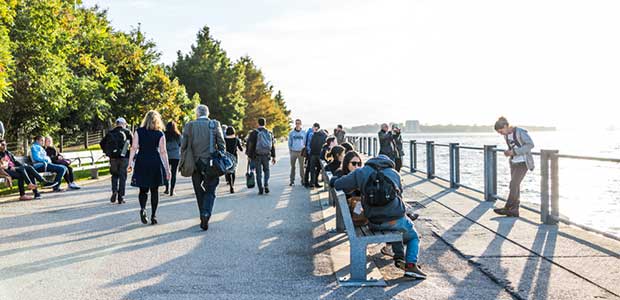
Coronavirus Coping: Online Shopping, Going Outside & Trends by State
A recent survey by WalletHub on social distancing and coronavirus coping examines Americans’ attitudes and behaviors during the pandemic. The results showed which states were best and worst at social distancing, and how individuals are coping in self-isolation.
Washing your hands, wearing gloves, using masks—all of these recommendations are circulating about protecting people against the coronavirus, but none are more effective than social distancing.
While it is clear that keeping your distance from others will help slow the spread, this is often easier said than done. Some people are enjoying slower days at home, curled up on the couch with nothing to do—but others are struggling to adapt their social lives, mental health, exercise routines and jobs. According to a recent poll from the American Psychiatric Association, over one third of Americans say their mental health has taken a hit as a result of the pandemic.
WalletHub’s recent survey on social distancing shows that social distancing is far from easy—especially in certain states it seems, according to its report titled States Where Social Distancing is Most Difficult. WalletHub compared all 50 states and the District of Columbia across 13 key metrics. The data set ranges from whether residents have supportive relationships to how much consumers spent on social activities before COVID-19.
Alongside this report, WalletHub also released a Social Distancing Survey, which looks at how Americans’ attitudes and behaviors have changed during the pandemic.
States Where Self-Isolating is Most Difficult
The survey provides a graph listing each state’s overall rank, total score, social environment rank, time spent on social activities rank and money spent on social activities rank. The Top Five states ranked highest overall were: Utah, New Hampshire, Montana, Colorado and Alaska, respectively. The Last Five states ranked lowest for overall rank were Rhode Island, Kentucky, West Virginia, Mississippi and Alabama, with Alabama the lowest ranked.
The survey also listed which states had the highest and lowest volunteer rates. Utah and Minnesota were the two highest and Mississippi and Florida were the lowest.
The survey noted states with the longest and shortest time per day spent socializing and communicating. New Hampshire and South Dakota tied for first, and New Mexico and Alaska ranked the two lowest.
The survey also noted states with the most time per day spent on sports, exercise and recreation compared with states with the least amount of time per day. Oregon and Colorado ranked the highest, whereas District of Columbia and Louisiana ranked the lowest.
The survey also ranked states based on the highest and lowest total annual consumer expenditures per household related to social activities adjusted by cost of living. Virginia and New Jersey ranked highest, and West Virginia and Maine ranked lowest.
States were ranked on the basis of highest travel and tourism spending per capita versus lowest. Five states tied for first in this area (District of Columbia, Hawaii, Nevada, Wyoming and Florida), and Indiana and Ohio ranked lowest.
Pandemic Behaviors and Attitudes
WalletHub also researched the way Americans are coping with the pandemic. Many people’s mental health has taken a toll. Its key findings showed:
- Online shopping is a popular stress reliever: 36 million Americans use online shopping as their number one way to cope with social distancing.
- Nearly half of the population still goes outside: 48 percent of Americans go outside at least once a day while self-quarantining.
- Women worry more: Women are 40 percent more likely to feel anxious than men due to social distancing.
- People want to see family most: 34 percent of Americans are most looking forward to seeing family when this is over—more than those most excited about seeing friends and going out to eat.
- Most Americans use masks: 60 percent of Americans are now wearing face masks due to the virus.
- Social distancing provides an opportunity to build skills: Almost 29 million Americans are using the social distancing time to learn something new.
While these were the biggest takeaways from the survey, the study revealed more data. For example, 201 million Americans say they feel annoyed or angry when they see others not practicing social distancing.
Are you wondering about the reason why women are more anxious, or why people are continuing to go outside? Well, the survey also shares anecdotes from health experts on potential reasons for these results.
For example, many experts say women tend to be more social than men—women have more emotional connections, are often more empathetic and tend to care more about what others think of them. Many experts say it’s not surprising people are going outside since fresh air and sunshine can do wonders for mental health.
Social distancing is affecting Americans in a number of ways—for some, it’s not too heavy on their mental health, but for others, it’s tough. Twenty-three percent of the survey’s responders say social distancing makes them feel responsible. Twenty-two percent say it makes them feel depressed. Others say it makes them feel safe, anxious or no different overall.
WalletHub’s research has highlighted some notable trends among Americans during this pandemic. While most people understand the importance of social distancing in fighting the virus, many find it very difficult. Where do you fall among these stats?